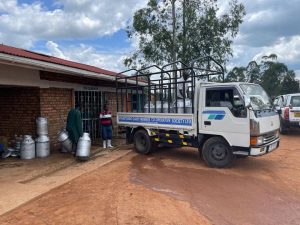#OutToLunch. What we could learn from Kenya’s China Square
By Denis Jjuuko If you are an ardent follower of regional news, you have most likely come across China Square, a popular retailer located inside Kenyatta University’s Unicity Shopping Mall in Nairobi. China Square has been in the news for committing a heinous crime of selling its wares way cheaper than Kenyan traders prompting action from Kenya’s cabinet secretary for trade. The secretary said foreigners should be involved in manufacturing not running retail outlets in glitzy shopping malls. One Kenyan distributor had even petitioned the country’s standards bureau to complain about the quality of some of the products on China Square’s shelves. The standards bureau found the product to be genuine from the same manufacturer. The Kenyan distributor was selling them at a very high price compared to China Square. Buoyed by the revelations of the standards authority, many Kenyans like they usually do, turned to Twitter to argue that Kenyan traders were charging so much for the same product and they had no problem buying from China Square. Back home in Uganda, many foreign traders particularly from Asia have set up shop in every little building known as an arcade or mall. Ugandan traders too complain about the Indians and the Chinese and how they are undercutting them with cheaper prices though being Uganda, these complaints haven’t received the attention of a minister or permanent secretary. But what makes products of Ugandan traders from the same manufacturers expensive? There is the issue of high interest rates on bank loans. It is inconceivable how a trader borrowing money at highs of 25% can be able to trade and survive. Some even go to informal money lenders who charge as much as 10% per a month or 120% annually. Unless you are selling contraband, it is not possible to do business where the loan interest rate is 5-10% per a month. It is a license to fail. The foreigners are usually coming in with loans at under 3% annually. Many actually don’t even have loans, they are using supplier’s credit where suppliers and manufacturers give them goods on credit to pay back in a particular period long after goods have been sold off. Many Ugandans also have access to the supplier’s credit though we are good at abusing it. Many Ugandans once they get goods on credit once or twice, they change numbers and location. Eventually, they become endlessly broke and blame everyone but themselves. If you think this isn’t the case, how many people have borrowed money from you and paid it back? Or even paid it on time? If people complain if you send them money on their mobile phone before asking them which number where they don’t have a credit they don’t want to pay back, what about a supplier in the far east? So we end up all the time looking for money to pay new suppliers instead of cementing lasting relationships with one who has been extending goods on credit. Then the cost of doing business. In downtown Kampala, you will find four traders or more renting one shop but each is suspicious of the others. So, each of these four traders flies to China, Dubai or Turkey to bring the same product. That is four air tickets, four hotel rooms (or some shanty digs in Deira) instead of one. The foreigners would send one person to do the shopping. In fact, they wouldn’t even send, they would simply send an email and goods are shipped in. A foreigner who will save four air tickets and accommodation for a week will certainly sell their merchandise at a cheaper rate. Ugandan traders must create lasting collaborations with suppliers and also embrace technology. And then of course our other weaknesses such as diverting money for self-actualization projects. A house in the village in which we spend less than 10 nights a year, a wedding deserving a top member of the royal family, a residential house in the city the size (and even shape) of a midsize shopping mall, a fancy but old SUV, a mistress in each corner of Kampala (for men), and a long line of children. As many Kenya traders are building and buying fancy apartments, the China Square people are most likely renting one in a walkable distance to their shop and only having a few children. The writer is a communication and visibility consultant. djjuuko@gmail.com

